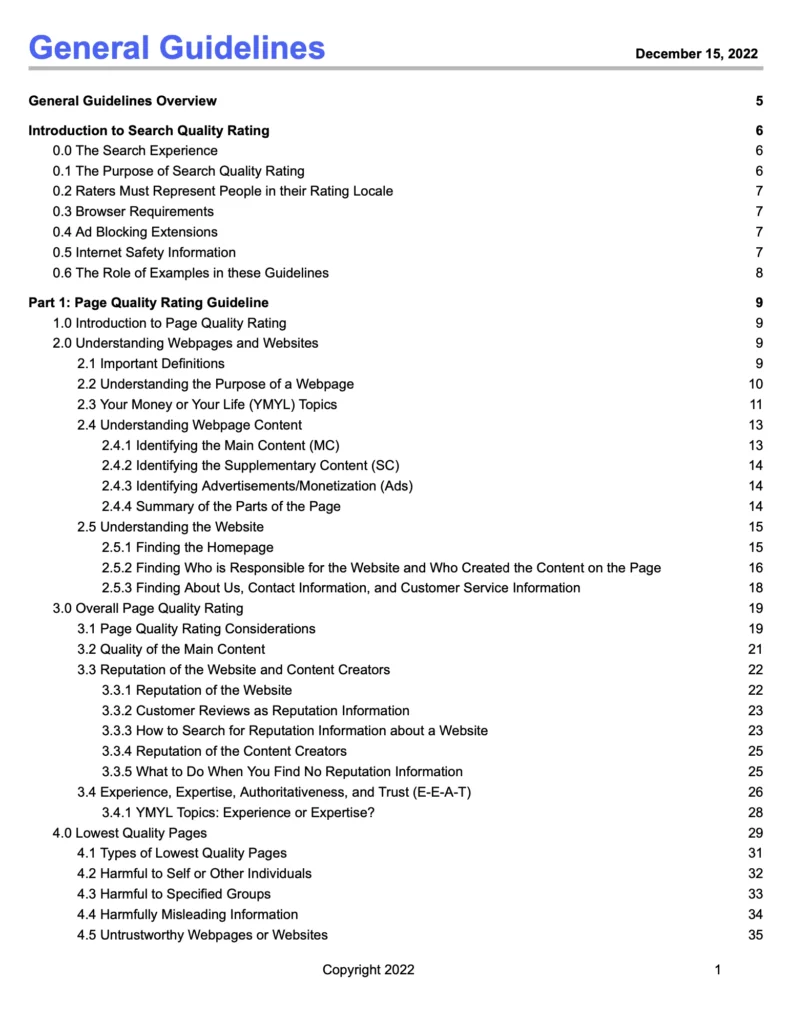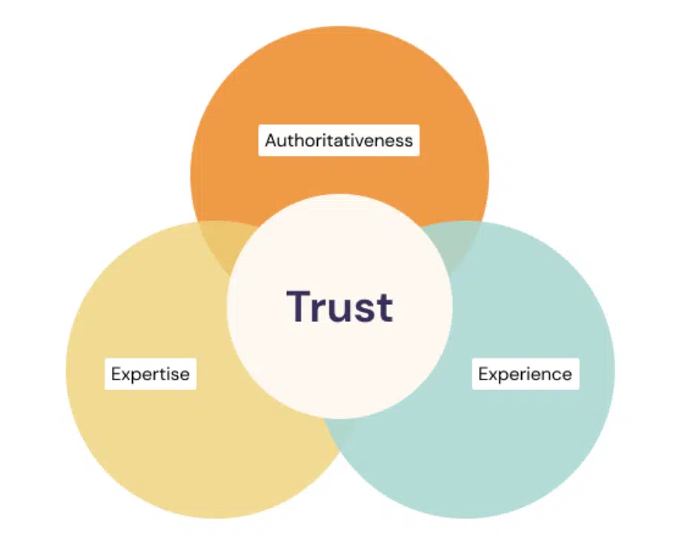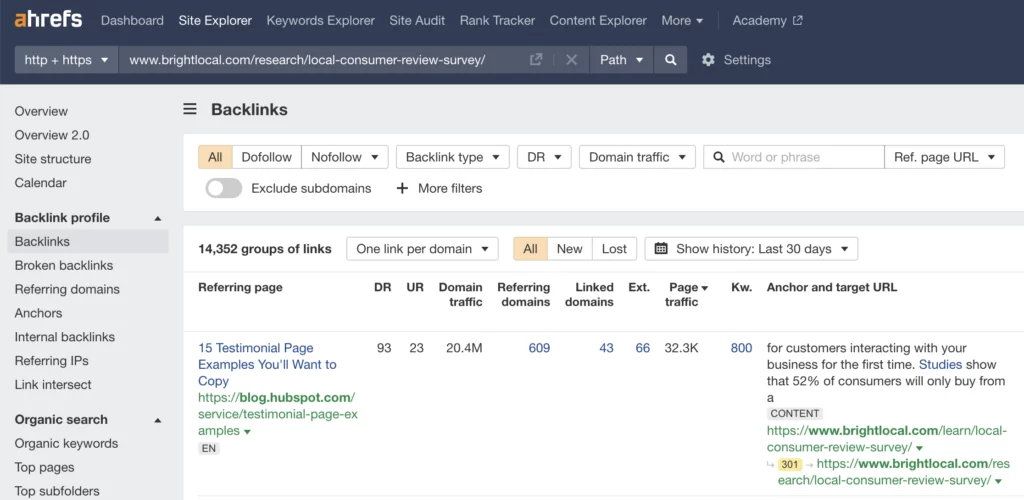E-E-A-T stands for Experience, Expertise, Authoritativeness, and Trustworthiness, and understanding it is key to ranking content in 2023.
We will cover how E-E-A-T impacts your SEO strategy and several ways to optimize your website to improve your organic search ranking.
Google added a second “E” for “Experience” to their search guidelines on December 15, 2022, demonstrating that they are starting to highly value first-hand experience in their search rankings.

Google’s Search Quality Guidelines is an extensive 176-page document providing insights on how Google evaluates the quality of websites to improve the Google search algorithm and give a better user experience to searchers. This is the first public change to E-A-T since 2014, when it was first mentioned.
Though not technically a ranking factor, changes to the guidelines do become part of Google’s search algorithm.
Read on to find out what impact this change has on SEO and eight tips for optimizing your site for E-E-A-T.
First, let’s dig deeper into what E-E-A-T framework is:
What is E-E-A-T?
E-E-A-T is an acronym for Experience, Expertise, Authority, and Trustworthiness. The quality of a web page overall is affected by how well it demonstrates all four factors.
Google employs real people, known as Search Quality Raters [1], who exhaustively conduct evaluations against Google’s Search Quality Rater Guidelines to see if the pages provide a helpful match to a search query.
Each element of E-E-A-T is ranked individually, meaning it’s possible to rank high on one and low on another. Note that Google has emphasized that trust is the most critical element of the four.
E-A-T vs. E-E-A-T
The second “E” in “E-E-A-T” was included to better assess search results to see if it provides valuable and helpful information to readers by giving more weighting to the “Experience” exhibited by the author(s).
This change means Google is putting more value on content written from first-hand experience.
For example, if a blog posts about the top 5 places to ski, Google wants to know if the author has ever skied themselves by seeing what they’ve said about it.
Not only does this add a level of credibility to the source, but it ensures that readers are gathering content from experienced individuals. You wouldn’t want to read through a webpage on a recipe for “the World’s Best Chocolate Cake” only to realize the author has never baked!
Here’s a explanation of each of the four letters in E-E-A-T and how it affects SEO:
Experience
The new Experience dimension examines whether the content creator has demonstrated experience in the topic they’re writing about. For example, if an author posts a recipe, have they actually prepared that dish before? Or if someone leaves a product review, Google wants to know whether that person has used that product.
The experience factor attempts to examine a writer’s real-world experiences. Social media posts and forum discussions are examples of high quality content in this area. As such, including reviews, photos or video media in your content can help to depict your experience.
Expertise
Expertise looks at the real-world knowledge of the writer. Google wants to know what the writer has experienced and any formal training they’ve received.
Google is looking for content specifically written by subject matter experts, instead of copywriters and others who have not demonstrated any real knowledge in the area.
To signal expertise, have helpful and valuable content from subject matter experts on your site, with clear citations to quality sources. Publish SEO-friendly author profile pages detailing their expertise, and link to them from article bio / bylines.
Authoritativeness
Authority is closely related to expertise and pertains to whether others perceive you, your content, and the website where the content is on as a credible source on that topic.
Do other experts mention you by name, or even better, cite your articles? Having several high quality backlinks is another indicator that other sources view your information as reliable.
Trustworthiness
Google states that Trust is the most important factor at the center of E-E-A-T.
Trust is a relative score, meaning your content on a specific topic will be rated compared to other sources on that topic. Raters look at your website’s transparency and legitimacy and evaluate your content’s accuracy. Reviews and business listings such as your Google My Business page are considered.
In addition, here are some points to avoid negatively affect the perceived trustworthiness of your website:
- Out of date content
- Missing or inconsistent contact information
- Excessive ad placements or ads from known spam sources
- Content that doesn’t address what users are looking
Narrowing your field of vision to focus your content in areas of your expertise will avoid spreading your content too thin on topics that your team may be less confident in.

Why is Your E-E-A-T Score Important for SEO
Is E-E-A-T really that important for your SEO?
Yes! All elements of E-E-A-T are considerations influence search results. A quick search of Google’s Search Quality Rater Guidelines PDF shows that “E-E-A-T” is mentioned 126 times!

Impact on organic search
Search engines have algorithms that consider a combination of factors to determine whether a website is relevant and valuable to readers. By using E-E-A-T as a guideline, you can understand how to better increase your presence in search results, leading to higher website traffic and greater brand awareness and visibility.
User engagement
Having quality, authoritative, and trustworthy content can improve the trust and engagement of readers. Once a user sees your site as valuable and relevant, they’re more likely to return and share it with their network.
Insight into Google’s algorithm
Google’s algorithm is a black box, and it’s so complex that no one person, even a Google engineer, could understand it all. However, by following the E-E-A-T guidelines, you increase your chances of ranking better.
Google actively discourages “writing for search”, but understanding E-E-A-T and other parts of the guidelines gives insight into how Google assesses the quality of your content, and therefore how well it ranks.
Is your content valuable to readers?
Remember, quality over quantity. There is no use writing a plethora of content when it provides no value to readers. As Google and other search engines get smarter, it’ll be harder and harder to “game” the system.
Simply put, try to provide users with the best answer to their search, with good UX and authoritative citations. By ignoring E-E-A-T in your digital marketing strategy, you may end up wasting a lot of time and resources creating content that will never be discovered via search.
How to Optimize your E-E-A-T
Create quality content
High-quality content demonstrates your expertise in a particular area. Rather than focusing on producing a high volume of thin content, research specific topics that your target audience would find helpful and create comprehensive guides.
Anticipate questions using tools like AlsoAsked or simply by using Google’s autocomplete and paying attention to featured snippets.
Writing quality content that is timely, easy to understand, comprehensive, and objective helps you build authority and trust with readers.
Get backlinks
Backlinks are defined as when another website links to your website.
Originally this was what separated Google from the other search engines – it figured if many reputable websites link to your website, your website is probably high quality as well.
For example, if your site is linked to from Wikipedia and The New York Times, it’s going to put you at the top!
Here are some strategies on how to get backlinks:
- Find popular content that has earned many links from other sites. Make a better piece
- Search for mentions of your brand on other sites that are unlinked. Send them a note
- Connect with bloggers and reporters. Use a HARO service (Help A Reporter Out)
- Appear on podcasts, and ask for a backlink in the show notes
- Create infographics
- Create industry surveys with statistics – writers love citing numbers!
- Create “Skyscraper” content – content that is just so good that others can’t help but link to
- Get mentioned in “Best X” lists
- Guest post on quality sites. Include a link in your byline
- Build free tools
- Publish ultimate guides
- Use directories
Backlinks are not easy to get, but they are a critical ranking factor. Not only do they help with search rankings, but visitors may come to your site directly from those links.
Include a Privacy Policy & Terms of Use
A Privacy Policy or a Terms of Use on your website can increase your E-E-A-T by showing transparency and professionalism, demonstrating your company’s compliance with laws and regulations (Google has started to evaluate for compliance) and can build trust and credibility with your audience, for instance by having a clear warranty policy.
Have an “About Us” page
Building trust with your audience means letting them know who you are and what you do.
An author page allows you to show off your team’s credentials, certifications, knowledge, awards, and expertise to gain the confidence of your readers.
Get reviews and testimonials
According to a survey conducted by BrightLocal, 84% of consumers trust online reviews as much as personal recommendations.
It’s easy to talk about how reliable your content is, but it is much more meaningful when you hear it from someone else, especially if they are reputable. Having validation and recognition from clients and other companies demonstrates your expertise.
On a meta level, this statistic from 2022 is an example of a successful backlink strategy that has netted BrightLocal 14,352 backlinks, including a very valuable one from Hubspot.

Secure your site
Securing your site lets your audience know that your website is trustworthy and has some level of security. It can be as simple as using an HTTPS protocol to encrypt the data between the server and the client to protect your website and your user’s information.
Just be careful you have your redirects setup correctly – search engines see http://yoursite.com and https://yoursite.com as different websites! Read more about https issues and how to resolve them in our Ultimate Guide to SEO Audits.
Update content regularly
Keep track of what content is timeless (“evergreen” in SEO-speak) and which are most likely to become obsolete. Create a content strategy around updating these posts regularly, and if it makes sense, add the current year in the title.
Link to quality sources
There used to be a school of thought among SEO’s and bloggers where you wanted to minimize the number of outbound links on a page. The reasoning was that it would cause “SEO juice” to “leak” out of your website.
What we now know is if those links are relevant and to authoritative sources, they actually help a page’s search ranking.
The number of links relevant to the length of your content does matter however so you don’t want to overdo it (Wikipedia after all makes all links “nofollow”, a parameter to let search engines know not to treat this link as a regular link for search rankings), but this is becoming less and less relevant as nofollow links are still used as a ranking signal.
In summary, cite your sources, it shows the user (and Google), you’ve done your research.
Final Thoughts
As ambiguous as Google is around how they rank sites, E-E-A-T is the visible tip of the iceberg that allows us to look into how Google prioritizes when evaluating your website.
Google’s goal is to evolve its algorithm to improve user experience and satisfaction to ensure that their platform provides users with valuable search results for their queries (so more users stay use Google and show you more ads, sad but true).
With that, E-E-A-T should be in the core framework for your SEO strategy to ensure that you deliver audiences with the most relevant results that flaunt your experience, expertise, authority and trustworthiness.
If you need help designing a content strategy, an SEO audit or coming up with content ideas, that’s right up our alley here at Big Cedar. Visit our services or reach out to us today!
[1] How Search Works and our Search Quality Rater Tests. Google Support. https://www.google.com/search/howsearchworks/how-search-works/rigorous-testing/







